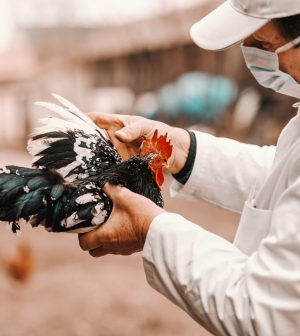- Could Your Grocery Store Meat Be Causing Recurring UTIs?
- Are You Making This Expensive Thermostat Error This Winter?
- Recognizing the Signs of Hypothyroidism
- 10 Strategies to Overcome Insomnia
- Could Artificial Sweeteners Be Aging the Brain Faster?
- Techniques for Soothing Your Nervous System
- Does the Water in Your House Smell Funny? Here’s Why
- Can a Daily Dose of Apple Cider Vinegar Actually Aid Weight Loss?
- 6 Health Beverages That Can Actually Spike Your Blood Sugar
- Treatment Options for Social Anxiety Disorder
Largest U.S. Egg Producer Says Bird Flu Detected in Chickens at Texas Plant

A Texas plant full of egg-laying hens has been shut down temporarily after bird flu was detected in the animals.
Cal-Maine Foods, the largest egg producer in the country, said in a news release issued Tuesday that it had to subsequently cull about 1.6 million hens and 337,000 pullets (young hens) at the plant.
“According to the U.S. Centers for Disease Control and Prevention, the human health risk to the U.S. public from [bird flu] viruses is considered to be low,” the company noted. “Also, according to the USDA, [bird flu] cannot be transmitted through safely handled and properly cooked eggs. There is no known risk related to [bird flu] associated with eggs that are currently in the market and no eggs have been recalled.”
The news follows reports on Monday that a dairy worker in Texas was being treated for avian influenza, becoming the second known human case in the United States. The U.S. Centers for Disease Control and Prevention said the person tested positive for H5N1 bird flu.
Meanwhile, Minnesota officials reported the first infection of bird flu among livestock in the United States last month, when a juvenile goat living on a farm with infected chickens tested positive.
Bird flu was also detected in dairy cows in Texas and Kansas last month. And U.S. officials said Tuesday that cows in Michigan had also tested positive and that there were presumptive positive tests among cows in Idaho and New Mexico, suggesting the virus may be spreading among cattle.
While health officials have stressed the risk to human health remains low, people should avoid uncooked or undercooked food, unpasteurized milk and raw cheese, the CDC stated. Cooking eggs or poultry to about 165 degrees Fahrenheit generally “kills bacteria and viruses, including bird flu viruses,” it noted.
Human symptoms of bird flu include eye redness, fever, coughing, sore throat, muscle or body aches, headaches, fatigue, shortness of breath or difficulty breathing. Diarrhea, nausea, vomiting or seizures are less common, the CDC said.
More information
Visit the U.S. Centers for Disease Control and Prevention for more on bird flu.
SOURCES: Cal-Maine Foods, news release, April 2, 2024
Source: HealthDay
Copyright © 2026 HealthDay. All rights reserved.










